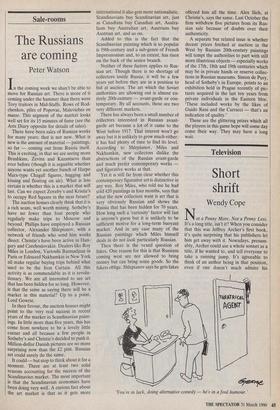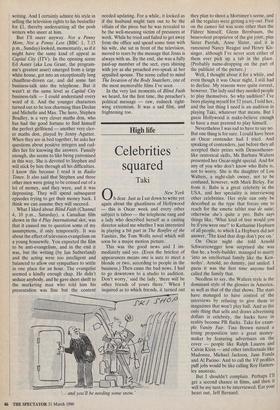Television
Short shrift
Wendy Cope
Not a Penny More, Not a Penny Less. It's a long title, isn't it? When you consider that this was Jeffrey Archer's first book, it's quite surprising that his publishers let him get away with it. Nowadays, presum- ably, Archer could use a whole sonnet as a title, if he wanted to, and tell everyone to take a running jump. It's agreeable to think of an author being in that position, even if one doesn't much admire his
writing. And I certainly admire his style in selling the television rights to his bestseller for £1, thereby undercutting all the posh writers who sneer at him.
But I'll sneer anyway. Not a Penny More, Not a Penny Less (BBC 1, 7.15 p.m., Sunday) looked, momentarily, as if it might have the same kind of appeal as. Capital City (ITV). In the opening scene Ed Asner (aka Lou Grant, the program- me's greatest asset) emerged from a large white house, got into an exceptionally long chauffeur-driven car, and did some fast business-talk into the telephone. But it wasn't at the same level as Capital City business-talk — I could understand every word of it. And the younger characters turned out to be less charming than Declan and Michelle and Max. The hero, Stephen Bradley, is a very clever maths don, who has had the good fortune to find himself the perfect girlfriend — another very clev- er maths don, played by Jenny Agutter. When they are in bed together, he asks her questions about positive integers and cud- dles her for knowing the answers. Funnily enough, she seems to like being patronised in this way. She is devoted to Stephen and will stick by him through all his difficulties. I know this because I read it in Radio Times. It also said that Stephen and three other men were going to be conned out of a lot of money, and they were, and it was depressing. They will spend subsequent episodes trying to get their money back. I think we can assume they will succeed.
What I liked about Blind Faith (Channel 4, 10 p.m., Saturday), a Canadian film shown in the 4 Play International slot, was that it caused me to question some of my assumptions, if only temporarily. It was about the effect of television evangelism on a young housewife. You expected the film to be anti-evangelism, and in the end it was, but the writing (by Ian Sutherland) and the acting were too intelligent and balanced to allow our sympathies to settle in one place for an hour. The evangelist seemed a kindly enough chap. He didn't seduce anybody, and he gave short shrift to the marketing man who told him his presentation was fine but the content
and you'll be needing some snow.' needed updating. For a while, it looked as if the husband might turn out to be the villain of the piece but he was revealed to be the well-meaning victim of pressures at work. While he tried and failed to get away from the office and spend some time with his wife, she sat in front of the television, moved to tears by the message that Jesus is always with us. By the end, she was a fully paid-up member of the sect, eyes shining with joy as she preached evo-speak at her appalled spouse. The scene called to mind The Invasion of the Body Snatchers, one of the most memorable films I've seen.
In the very last moments of Blind Faith we heard, for the first time, the preacher's political message — raw, redneck right- wing extremism. It was a sad film, and frightening too.



























































 Previous page
Previous page